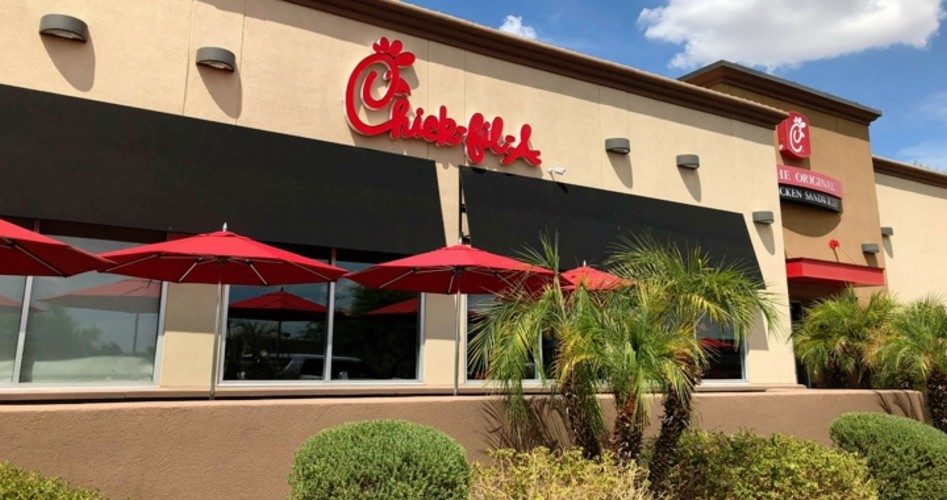
In spite of being closed on Sundays and the commitment of its owners to support conservative Christian values, fast-food chain Chic-fil-A is on course to become the third-largest restaurant chain in the United States
According to top business analyst Mark Kalinowski, Chick-fil-A’s 2018 sales have taken it from the No. 7 spot in 2017 to the cusp of No. 3, trailing only McDonald’s and Starbucks, and besting fast-food favorites Taco Bell, Subway, and Burger King.
Kalinowski said that he has been saying for some time that “Chick-fil-A is the restaurant competitor with which McDonald’s … should most concern itself — and by extension, investors should, too.” He noted that Chic-fil-A’s growing dominance should likewise have fast-food giant Wendy’s, with its popular chicken sandwich category, concerned about the future.
Chic-fil-A’s overwhelming success has come in spite of late founder Truett Cathy’s decision in 1946 to keep Chic-fil-A closed on Sundays to honor the Christian Sabbath — a policy that continues to this day. “Having worked seven days a week in restaurants open 24 hours,” explains the chain’s website, “Truett saw the importance of closing on Sundays so that he and his employees could set aside one day to rest and worship if they choose — a practice we uphold today.”
Jodee Morgan, senior director of culture and talent operations for Chick-fil-A, said that company management feels the policy is one key to the success of Chic-fil-A. “Despite being open only six out of seven days a week, we’ve been able to consistently generate more sales than competitors who are open every day,” Morgan said in a 2017 interview. “And I do think customers appreciate our policy. I know our employees do.”
The success has also come in spite of attempts by pro-homosexual individuals and groups to destroy the fast-food chain over past comments of its CEO, Dan Cathy, about his views on marriage and sexuality. During a 2012 radio interview, Cathy, son of the Chic-fil-A founder, famously said that neither he nor the chain supported same-sex marriage. “I think we are inviting God’s judgment on our nation when we shake our fist at Him and say, ‘We know better than you as to what constitutes a marriage,’” Cathy said at the time. “We are very much supportive of … the biblical definition of the family unit. We are a family-owned business, a family-led business, and we are married to our first wives.”
That seven-year-old statement has inspired groups committed to the LGBTQ agenda to aggressively oppose the opening of Chic-fil-A restaurants in cities such as Denver, Boston, Chicago, and, most recently, San Antonio. Nonetheless, the campaign has been mostly fruitless as Chic-fil-A’s runaway popularity with consumers has trumped LGBTQ grievance politics.
Conservative news site FreeBeacon.com noted that the “outraged left’s efforts to punish Chick-fil-A have not only failed, they are also starting to wear a bit thin among sympathetic Democrats. South Bend Mayor Pete Buttigieg, for example, is trying to become the first openly gay candidate in history to win a major party nomination. But he’s not necessarily sold on the ‘Boycott Chick-fil-A’ movement.” According to FreeBeacon, “Buttigieg said that while he didn’t approve of Chick-fil-A politics, he argued that Americans ‘should primarily deal with political issues in the political arena,’ and expressed concern that efforts to target problematic corporations could devolve into ‘sanctimonious virtue signaling.’”
Ultimately, said Rodney Bullard, head of Chick-fil-A’s charitable foundation, the restaurant chain “has a much higher calling than any political or cultural war.” As for what the company supports in charitable funding, which includes much that is child-centered, Bullard said that it’s all about the company’s “calling to help people, and I think at times that has been confused with a calling, somehow, to exclude. And that’s not the case. The focus, the phrase ‘every child’ — we’re very intentional about that. We do have programs and we look for programs that are inclusive as well to help every child.”
He added that “at the end of the day, the calling for us is to ensure that we are relevant and impactful in the community, and that we’re helping children and that we’re helping them to be everything that they can be.”
Image: pexels.com



